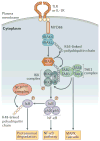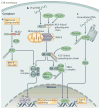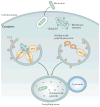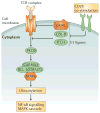The role of ubiquitylation in immune defence and pathogen evasion
- PMID: 22158412
- PMCID: PMC3864900
- DOI: 10.1038/nri3111
The role of ubiquitylation in immune defence and pathogen evasion
Abstract
Ubiquitylation is a widely used post-translational protein modification that regulates many biological processes, including immune responses. The role of ubiquitin in immune regulation was originally uncovered through studies of antigen presentation and the nuclear factor-κB family of transcription factors, which orchestrate host defence against microorganisms. Recent studies have revealed crucial roles of ubiquitylation in many aspects of the immune system, including innate and adaptive immunity and antimicrobial autophagy. In addition, mounting evidence indicates that microbial pathogens exploit the ubiquitin pathway to evade the host immune system. Here, we review recent advances on the role of ubiquitylation in host defence and pathogen evasion.
Conflict of interest statement
The authors declare no competing financial interests.
Figures






References
Publication types
MeSH terms
Substances
Grants and funding
LinkOut - more resources
Full Text Sources
Other Literature Sources

